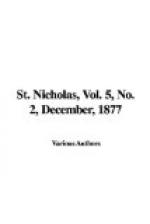There was no resisting such a strong hint as this: however, I pretended to think about it for a moment, and then said, “Well, I like ’Ting, ting, ting,’ best of all.”
“That shows you’re a good judge of music,” Bruno said, with a pleased look. “How many bluebells would you like?” And he put his thumb into his mouth to help me to consider.
As there was only one bluebell within easy reach, I said very gravely that I thought one would do this time, and I picked it and gave it to him. Bruno ran his hand once or twice up and down the flowers,—like a musician trying an instrument,—producing a most delicious delicate tinkling as he did so. I had never heard flower-music before,—I don’t think one can unless one’s in the “eerie” state,—and I don’t know quite how to give you an idea of what it was like, except by saying that it sounded like a peal of bells a thousand miles off.
When he had satisfied himself that the flowers were in tune, he seated himself on the mouse (he never seemed really comfortable anywhere else), and, looking up at me with a merry twinkle in his eyes, he began. By the way, the tune was rather a curious one, and you might like to try it for yourself, so here are the notes:
[Illustration]
“Rise, oh, rise!
The daylight dies:
The
owls are hooting, ting, ting, ting!
Wake, oh, wake!
Beside the lake
The
elves are fluting, ting, ting, ting!
Welcoming our
fairy king
We
sing, sing, sing.”
He sang the first four lines briskly and merrily, making the bluebells chime in time with the music; but the last two he sang quite slowly and gently, and merely waved the flowers backward and forward above his head. And when he had finished the first verse, he left off to explain.
“The name of our fairy king is Obberwon” (he meant Oberon, I believe), “and he lives over the lake—there—and now and then he comes in a little boat—and then we go and meet him—and then we sing this song, you know.”
“And then you go and dine with him?” I said, mischievously.
“You shouldn’t talk,” Bruno hastily said; “it interrupts the song so.”
I said I wouldn’t do it again.
“I never talk myself when I’m singing,” he went on, very gravely; “so you shouldn’t either.”
Then he tuned the bluebells once more, and sung:
“Hear, oh, hear!
From far and near
A
music stealing, ting, ting, ting!
Fairy bells adown
the dells
Are
merrily pealing, ting, ting, ting!
Welcoming our
fairy king
We
ring, ring, ring.
“See, oh, see!
On every tree
What
lamps are shining, ting, ting, ting!
They are eyes
of fiery flies
To
light our dining, ting, ting, ting!
Welcoming our
fairy king
They
swing, swing, swing.
“Haste, oh, haste!
to take and taste
The
dainties waiting, ting, ting, ting!
Honey-dew is stored—”




